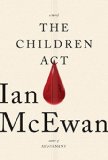Summary | Excerpt | Reading Guide | Reviews | Beyond the Book | Readalikes | Genres & Themes | Author Bio

ONE
London. Trinity term one week old. Implacable June weather. Fiona Maye, a High Court judge, at home on Sunday evening, supine on a chaise longue, staring past her stockinged feet toward the end of the room, toward a partial view of recessed bookshelves by the fireplace and, to one side, by a tall window, a tiny Renoir lithograph of a bather, bought by her thirty years ago for fifty pounds. Probably a fake. Below it, centered on a round walnut table, a blue vase. No memory of how she came by it. Nor when she last put flowers in it. The fireplace not lit in a year. Blackened raindrops falling irregularly into the grate with a ticking sound against balled-up yellowing newsprint. A Bokhara rug spread on wide polished floorboards. Looming at the edge of vision, a baby grand piano bearing silver-framed family photos on its deep black shine. On the floor by the chaise longue, within her reach, the draft of a judgment. And Fiona was on her back, wishing all this stuff at the bottom of the sea.
In her hand was her second Scotch and water. She was feeling shaky, still recovering from a bad moment with her husband. She rarely drank, but the Talisker and tap water was a balm, and she thought she might cross the room to the sideboard for a third. Less Scotch, more water, for she was in court tomorrow and she was duty judge now, available for any sudden demand, even as she lay recuperating. He had made a shocking declaration and placed an impossible burden on her. For the first time in years, she had actually shouted, and some faint echo still resounded in her ears. "You idiot! You fucking idiot!" She had not sworn out loud since her carefree teenage visits to Newcastle, though a potent word sometimes intruded on her thoughts when she heard self-serving evidence or an irrelevant point of law.
And then, not long after that, wheezy with outrage, she had said loudly, at least twice, "How dare you!"
It was hardly a question, but he answered it calmly. "I need it. I'm fifty-nine. This is my last shot. I've yet to hear evidence for an afterlife."
A pretentious remark, and she had been lost for a reply. She simply stared at him, and perhaps her mouth was open. In the spirit of the staircase, she had a response now, on the chaise longue. "Fifty-nine? Jack, you're sixty! It's pathetic, it's banal."
What she had actually said, lamely, was, "This is too ridiculous."
"Fiona, when did we last make love?"
When did they? He had asked this before, in moods plaintive to querulous. But the crowded recent past can be difficult to recall. The Family Division teemed with strange differences, special pleading, intimate half-truths, exotic accusation. And as in all branches of law, fine-grained particularities of circumstance needed to be assimilated at speed. Last week, she heard final submissions from divorcing Jewish parents, unequally Orthodox, disputing their daughters' education. The draft of her completed judgment was on the floor beside her. Tomorrow, coming before her again would be a despairing Englishwoman, gaunt, pale, highly educated, mother of a five-year-old girl, convinced, despite assurances to the court to the contrary, that her daughter was about to be removed from the jurisdiction by the father, a Moroccan businessman and strict Muslim, to a new life in Rabat, where he intended to settle. Otherwise, routine wrangles over residence of children, over houses, pensions, earnings, inheritance. It was the larger estates that came to the High Court. Wealth mostly failed to bring extended happiness. Parents soon learned the new vocabulary and patient procedures of the law, and were dazed to find themselves in vicious combat with the one they once loved. And waiting offstage, boys and girls first-named in the court documents, troubled little Bens and Sarahs, huddling together while the gods above them fought to the last, from the Family Proceedings Court, to the High Court, to the Court of Appeal.
Excerpted from The Children Act by Ian McEwan. Copyright © 2014 by Ian McEwan. Excerpted by permission of Nan A. Talese, a division of Random House LLC. All rights reserved. No part of this excerpt may be reproduced or reprinted without permission in writing from the publisher.
Talent hits a target no one else can hit; Genius hits a target no one else can see.
Click Here to find out who said this, as well as discovering other famous literary quotes!
Your guide toexceptional books
BookBrowse seeks out and recommends the best in contemporary fiction and nonfiction—books that not only engage and entertain but also deepen our understanding of ourselves and the world around us.